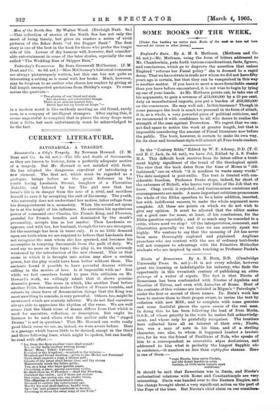In the "Century Bible," Edited by W. F. Adeney, D.D.
(T. C. and E. C. Jack, 28. 6d. net), we have Job, Edited by A. S. Peake. M.A. This difficult book receives from its latest editor a treat- ment highly significant of the trend of the theological spirit. The view that the book dates from the time of Moses is "old- fashioned," one on which "it is needless to waste many words." The date assigned is post-exilic. The text is treated with con- siderable freedom. Professor Peake stops, indeed, far short of the extremes of Bickell, who leaves very little of the Job that we know. Chap. xxviii. is rejected; and various minor omissions and rearrangements are made. A more important criticism pronounces the whole of the Elihu speeches to be a later addition, inserted, but with indifferent success, to make the whole argument more complete. All these are points on which we do not wish to give any opinion. It must be allowed that the editor makes out a good case for some, at least, of his conclusions, for the Elihu question especially ; and if so much may be conceded to a critic, where need we stop ? Of the interpretation, comment, and illustration generally we feel that we can scarcely speak too highly. We venture to say that the meaning of Job has never been more thoroughly explored and pxplained. Anglican preachers who are content with the use of ordinary text-books will not compare to advantage with the Primitive Methodist students who are inspired by such teaching as Professor Peebles.










































 Previous page
Previous page